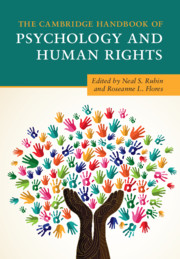Book contents
- The Cambridge Handbook of Psychology and Human Rights
- The Cambridge Handbook of Psychology and Human Rights
- Copyright page
- Dedication
- Contents
- Figures
- Tables
- Boxes
- Contributors
- Acknowledgments
- The Core International Human Rights Instruments and Their Monitoring Bodies
- Universal Human Rights Instruments
- Sustainable Development Goals
- Glossary of United Nations and Psychology Acronyms in the Handbook
- Introduction
- Part I History of Human Rights
- Part II The Intersection of Psychology and Human Rights
- Part III Contemporary Issues in Psychology and Human Rights
- Part IV Teaching, Research, and Training in Psychology and Human Rights
- 31 Decolonization and Liberation Psychology
- 32 Education of Psychologists for Human Rights Awareness, Accountability, and Action
- 33 Conducting Psychological Research across Borders
- 34 Diversity in Psychology Education and Training
- 35 Preparing Future Generations
- Part V Future Directions
- Index
- References
33 - Conducting Psychological Research across Borders
Maintaining Scientific Rigor and Safeguarding Human Rights
from Part IV - Teaching, Research, and Training in Psychology and Human Rights
Published online by Cambridge University Press: 02 October 2020
- The Cambridge Handbook of Psychology and Human Rights
- The Cambridge Handbook of Psychology and Human Rights
- Copyright page
- Dedication
- Contents
- Figures
- Tables
- Boxes
- Contributors
- Acknowledgments
- The Core International Human Rights Instruments and Their Monitoring Bodies
- Universal Human Rights Instruments
- Sustainable Development Goals
- Glossary of United Nations and Psychology Acronyms in the Handbook
- Introduction
- Part I History of Human Rights
- Part II The Intersection of Psychology and Human Rights
- Part III Contemporary Issues in Psychology and Human Rights
- Part IV Teaching, Research, and Training in Psychology and Human Rights
- 31 Decolonization and Liberation Psychology
- 32 Education of Psychologists for Human Rights Awareness, Accountability, and Action
- 33 Conducting Psychological Research across Borders
- 34 Diversity in Psychology Education and Training
- 35 Preparing Future Generations
- Part V Future Directions
- Index
- References
Summary
Adopting a human rights approach to human subjects research entails shifting an ethic of “avoiding harm” to one of “actively promoting good,” especially in international contexts. The implications for research procedures are discussed as a series of steps in research planning and implementation, selection of participants, and community involvement. Special issues in research with vulnerable populations and in “big data” research are addressed.
Keywords
- Type
- Chapter
- Information
- The Cambridge Handbook of Psychology and Human Rights , pp. 490 - 503Publisher: Cambridge University PressPrint publication year: 2020



